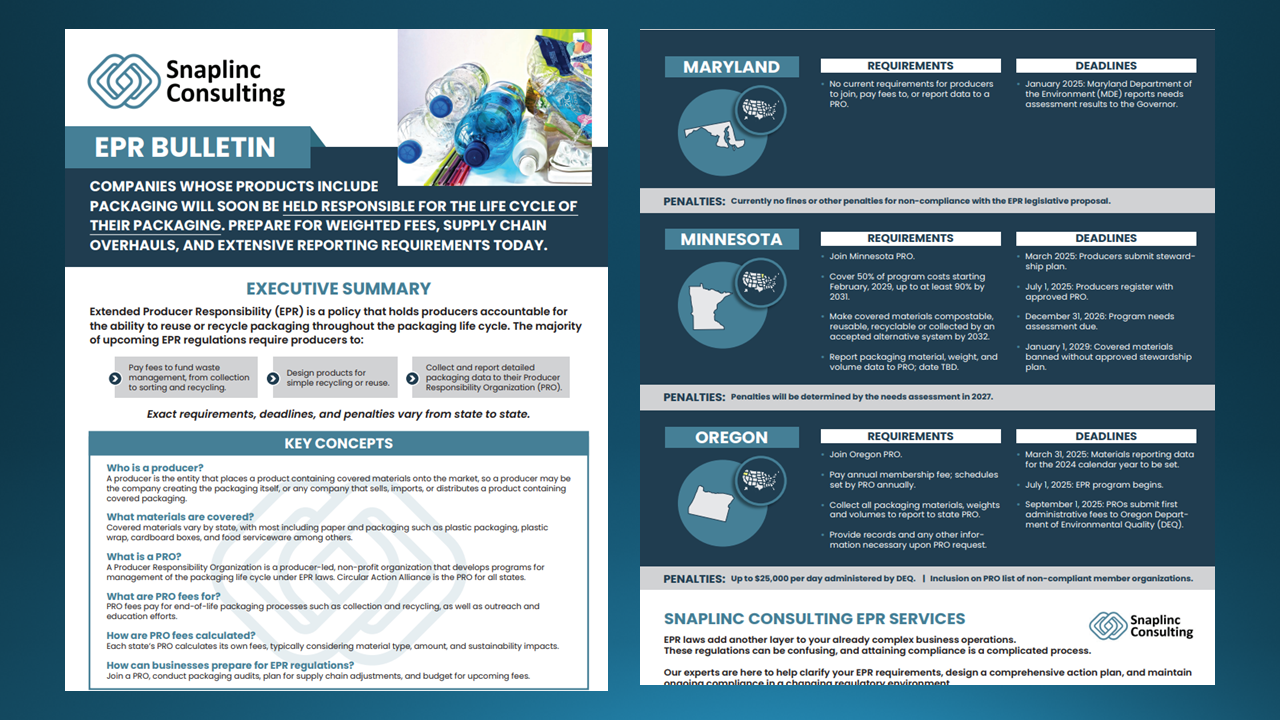EPA TSCA PFAS New Rule
PFAS UPDATE - EPA TSCA PFAS Rule requires measurement and reporting of all manufactured or imported products that contain PFAS. Report is due May 2025 and needs to include all PFAS-containing products manufactured or imported since January 1, 2011.
Background
The Environmental Protection Agency's new rule under the Toxic Substances Control Act (TSCA), focusing on Per- and Polyfluoroalkyl Substances (PFAS), went into effect on November 13, 2023. This rule mandates a one-time reporting event for any company that manufactured or imported PFAS containing products or chemicals at any point since January 1, 2011. This is a critical addition to the nation's environmental legislation. Here's what you need to know to comply.
Click here to view the official ruling.
What Specific Steps are Required?
Any company that knows or suspects their manufactured or imported products may contain PFAS is required to exercise certain levels of due diligence. They are required to review, and prepare to provide evidence of, existing information to determine if they have knowledge of PFAS being manufactured or imported in their products. If, after due diligence, a company ascertains that it does not have knowledge of PFAS being manufactured or imported in the products it handles, it may not need to report under this rule, but should retain documentation leading to their conclusion. If a company ascertains that PFAS have been manufactured or imported as part of their supply chain they must report.
Each company must report their information to the extent such information is known or reasonably ascertainable.
Reporting requirements are as follows:
Small manufacturers whose reporting obligations under this rule are exclusively from article imports and suspect they contain PFAS have the option to use a streamlined form that does not require all information required for the standard form. This will ask for the following:
Chemical Identity: Specific or generic name/description (CBI if specific).
Chemical Identification Number: CASRN, or Accession or LVE case number if applicable.
Trade/Common Name: Include if applicable.
Molecular Structure: For non-Class 1 PFAS on the inventory. Optional free text for clarification.
Import Production Volume: Volume of the imported article (rather than the PFAS) and the unit of measurement. E.g. the total weight of the PFAS-containing imported articles or the quantity of the article imported.
Industrial Processing and Use: Type, sector, functional use category, and percent of production volume for each.
Consumer and Commercial Use: Product category, functional use category, percent production volume for each, max concentration, and any other information.
For all others, the reporting requirements are:
Chemical Information: Common or trade name, chemical identity and molecular structure.
Use Information: Categories or proposed categories of use for each substance or mixture.
Production Information: Total amount manufactured or processed, amounts for each category of use, and reasonable estimates of proposed amounts.
Byproduct Descriptions: Descriptions of byproducts from the manufacture, processing, use, or disposal.
Environmental and Health Effects: All existing information on environmental and health effects.
Exposure Data: Number of individuals exposed, and reasonable estimates of individuals to be exposed in their places of work and the duration of their exposure.
Disposal Information: The manner or method of disposal and any change in disposal method.
All reporters must maintain accurate records for five years of all the above PFAS-related activities.
Click here for a more detailed list of reporting requirements.
Overwhelmed? We can help you!
What is the Timeline?
Most companies:
May 2025 (18 months from the November 13, 2023 rule to report)
The submission period will be a six-month period beginning twelve months after the November 13, 2023 rule.
Small manufacturers whose reporting obligations under this rule are exclusively from article imports:
November 2025 (24 months from the November 13, 2023 rule to report).
Click here to view the Small Entities Compliance Guide.
What are Penalties for Non-Compliance?
Non-compliance could lead to legal and financial consequences, including fines and enforcement actions.
Are There Any Exemptions or Limitations?
The rule primarily targets entities that have manufactured or used PFAS since January 1, 2011. There are no reporting exemptions or production volume thresholds.
There are no testing or labeling requirements imposed by this rule.
Companies who have only processed, distributed in commerce, used, and/or disposed of PFAS are not required to report under this rule, unless they also have manufactured PFAS for a commercial purpose.
Our Take
This rule significantly impacts a wide range of industries, necessitating an overhaul in chemical management and reporting practices. The scope of this complicated requirement can pose difficulty for anyone not prepared. Non-compliance is not an option due to potential penalties and the inherent risks to public health and the environment.
EPA TSCA PFAS Rule Compliance Support
At Snaplinc Consulting, we specialize in helping businesses navigate complex environmental regulations. We offer tailored services, including compliance planning, reporting assistance, and policy development. Expediency is critical, and non-compliance poses significant risks. Taking action is a legal obligation and a step towards more sustainable and responsible industrial practices.
Click here to view EPA’s reporting instructions.
Conclusion
The EPA's TSCA PFAS Rule adds to the growing list of regulations focusing on environmental protection and public health. Our expertise can guide you through the process of compliance, safeguarding your operations from risks and aligning them with contemporary environmental standards. Contact us for comprehensive support and join the movement towards a safer, more sustainable future.
For more questions or to request a discovery call, contact us below and/or directly schedule a meeting.


